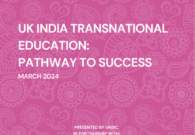Unshackling of Indian Economy post-COVID-19: Overcoming the Uncertain
UKIBC organised an interaction for senior members with Mr Gautam Chikermane, Vice-President of ORF, Ms Anubhuti Sahay, Executive Director and Head, South Asian Economic Research, Standard Chartered, and Ms Natalie Toms, Chief Economist and Counsellor at the British High Commission, Delhi to understand the path the Indian economy is expected to take post the COVID-19 pandemic and what would it imply for British Businesses in India.
UK and Indian ties are strong as evidenced by close G2G collaboration in recent weeks. Mr Modi addressed the Global Vaccine Summit hosted by the British PM, India and the UK jointly worked on the Action Plan drawn up by the Finance Ministers at the G20, and JETCO interactions are to begin next month followed by the Economic and Financial Dialogue.
Simultaneously, there has been extensive business collaboration, most notably on healthcare, including the export of paracetamol from India to the UK, PPE and potentially vaccine production.
Nonetheless, it is now clear that the Indian economy is heading for recession. In Q1 of 2020-21, it could drop by 35 percent. The full financial year could see a reduction of between 3 and 6 percent.
For India to emerge quickly and strongly from the recession, the government should drive through structural reforms and additional monetary and fiscal measures should be taken to stimulate demand, help businesses survive, and keep people in jobs.
The stimulus measures taken by the Reserve Bank of India and the Government have helped in the short term, but additional and more-aggressive measures are needed to get India back to growth levels of 6+ percent in the medium to long term.
There have been positive developments in recent weeks. One of which has been the way India’s traditionally change-averse judiciary has adopted AI and other digital processes to simplify and accelerate hearings.
The state of Madhya Pradesh has enacted significant ease of doing business improvements such as:
- Officials must ensure new businesses are registered in one day;
- all licences to set up a factory have been extended from one to ten years;
- the number of registers a business is expected to fill has been reduced from sixty-one to one; and
- factories employing less than 50 employees will not be inspected
So, there are some encouraging signs, but the big questions that remain unanswered are:
- What further stimulus package will the GoI and RBI put in place?
- Will the GoI and States enact the major structural reforms needed?
- Will the judiciary continue to embrace progress?
- What sectors will emerge strongly from the recession?
- Which sectors will be most damaged?
Another important question is what impact Atmanibhar Bharat – self-reliant India will have, particularly on UK businesses?
It is unclear what “Atmanirbhar Bharat” will mean in practice. Is it a slogan, or an economic strategy? For now, it seems that India remains open to international business and engagement. Yet, even if only a slogan, it is important to be mindful of the unintended consequence if global business leaders consider that India is a protectionist country.
We, at UKIBC, will continue to work with our members and clients to advocate for solutions that help UK businesses to operate in India and further strengthen the UK-India bilateral relationship







